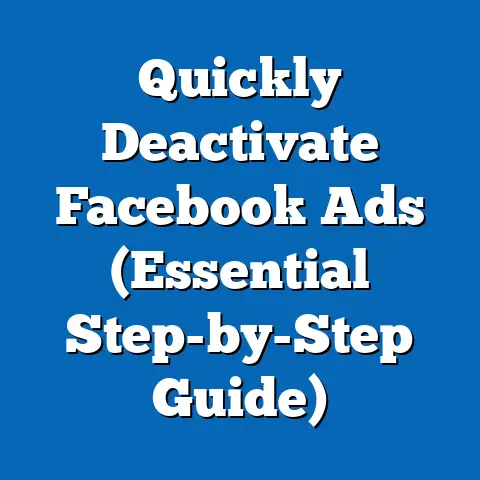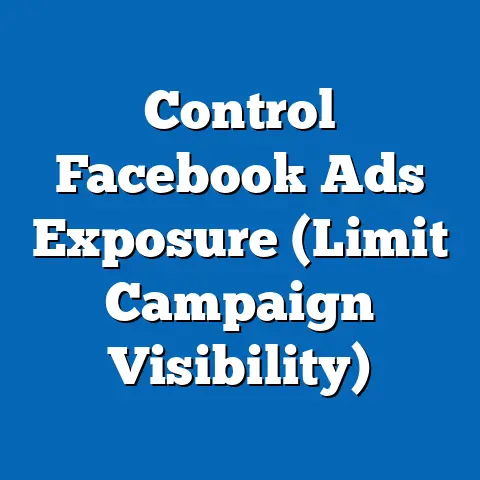Master Facebook Ad Regulations (Essential Insights Revealed)
Have you ever poured your heart and soul (and budget!) into a Facebook ad campaign, only to have it rejected at the last minute? I certainly have. I remember working with a local bakery launching a new line of gluten-free cupcakes. We crafted stunning visuals, wrote mouthwatering copy, and meticulously targeted their ideal customer. We were buzzing with excitement, ready to see those cupcakes fly off the (digital) shelves. Then came the dreaded notification: “Ad Disapproved.” Turns out, we’d inadvertently used language that implied we could “cure” dietary restrictions, a big no-no according to Facebook’s health claims policy. It was a tough lesson learned, and it highlighted the critical importance of understanding Facebook’s ad regulations.
Navigating the world of Facebook advertising can feel like traversing a minefield. One wrong step, one overlooked detail, and boom – your ad is rejected, your budget is wasted, and your potential customers are left in the dark. But it doesn’t have to be this way. Mastering Facebook ad regulations isn’t just about avoiding penalties; it’s about unlocking the platform’s full potential, building trust with your audience, and ultimately, driving better results for your business.
Section 1: Overview of Facebook Ad Regulations
Introduction to Facebook Ad Policies
Facebook ad regulations are a comprehensive set of guidelines that govern the content, targeting, and overall presentation of advertisements on the Facebook platform. Think of them as the “rules of the road” for advertising on Facebook. These policies are designed to protect users from misleading, offensive, or harmful content, while also ensuring a fair and transparent advertising ecosystem.
Facebook, now under the Meta umbrella, has a massive responsibility. With billions of users worldwide, they need to ensure a safe and positive experience for everyone. Their ad policies are a critical part of that effort. As advertisers, we have a responsibility to understand and adhere to these policies to maintain a healthy and trustworthy relationship with our audience.
Key Components
Facebook’s ad policies are vast and cover a wide range of topics. However, they can be broadly categorized into three main components:
- Prohibited Content: This category outlines the types of content that are strictly forbidden on Facebook ads. This includes, but is not limited to, hate speech, discriminatory practices, adult content, illegal products or services, and misleading or deceptive claims.
- Restricted Content: This category covers content that is allowed on Facebook ads, but with specific restrictions and limitations. This includes topics like alcohol, gambling, dating services, political advertising, and health-related products or services. These categories often require specific disclosures, age targeting restrictions, or other limitations.
- Community Standards: While not strictly “ad policies,” Facebook’s Community Standards also play a role in advertising. These standards outline what is and isn’t allowed on the platform in general, and ads that violate these standards will also be rejected. This includes things like graphic violence, bullying, and harassment.
I’ve found that understanding these three core components is the first step to creating compliant and successful Facebook ad campaigns. It’s about knowing the boundaries and understanding the nuances within each category.
Importance of Compliance
Non-compliance with Facebook ad regulations can have serious repercussions. Here’s what you risk when you ignore the rules:
- Ad Disapproval: This is the most common consequence. Your ad will be rejected and won’t be shown to your target audience. This means wasted time, effort, and potentially lost revenue.
- Account Suspension: Repeated violations can lead to temporary or permanent suspension of your Facebook ad account. This can cripple your marketing efforts and significantly impact your business.
- Reputational Damage: Running ads that are misleading, offensive, or harmful can damage your brand’s reputation and erode trust with your audience. In today’s world, online reputation is everything.
- Legal Consequences: In some cases, violating Facebook ad policies can also lead to legal action, especially if your ads contain false or misleading claims.
I’ve seen firsthand the devastating impact of non-compliance. I worked with a client in the financial services industry who ran ads promising guaranteed investment returns. Their ads were quickly flagged and their ad account was temporarily suspended. Not only did they lose valuable advertising time, but they also suffered reputational damage, as potential customers questioned their credibility.
Takeaway: Understanding and adhering to Facebook ad regulations is not optional; it’s essential for running successful and sustainable ad campaigns. It’s about protecting your business, building trust with your audience, and maximizing your return on investment.
Section 2: Prohibited Content
Defining Prohibited Content
Prohibited content on Facebook refers to the types of advertisements that are strictly forbidden from appearing on the platform. These regulations are in place to protect users, maintain a safe environment, and ensure that the content shared on Facebook aligns with ethical standards. Understanding what constitutes prohibited content is crucial for advertisers to avoid penalties and ensure their campaigns run smoothly.
Facebook’s prohibited content categories are quite extensive, but here are some of the most important ones to keep in mind:
- Hate Speech: This includes content that attacks, threatens, or dehumanizes individuals or groups based on characteristics like race, ethnicity, religion, gender, sexual orientation, disability, or other protected attributes.
- Discriminatory Practices: Ads that discriminate against individuals or groups based on the same protected attributes are also prohibited. This includes denying opportunities or treating people differently based on these characteristics.
- Adult Content: Ads that contain nudity, sexually suggestive content, or promote sexual services are strictly prohibited.
- Illegal Products or Services: Ads that promote illegal activities, products, or services, such as illegal drugs, counterfeit goods, or weapons, are not allowed on Facebook.
- Misleading or Deceptive Claims: Ads that contain false or misleading information, exaggerated claims, or deceptive practices are prohibited. This includes false promises about product performance, inaccurate pricing information, or deceptive targeting practices.
- Sensational Content: Ads that use shocking, sensational, disrespectful or excessively violent content are not allowed.
I always tell my clients to err on the side of caution when it comes to prohibited content. If you’re even slightly unsure whether your ad might violate a policy, it’s best to re-evaluate and make sure it’s compliant.
Case Studies
To illustrate the importance of avoiding prohibited content, let’s look at a few real-life examples:
- Example 1: The “Get Rich Quick” Scheme: A company ran Facebook ads promising guaranteed high returns on investments with little to no risk. These ads were quickly flagged for making misleading and deceptive claims. Not only were the ads disapproved, but the company also faced legal scrutiny for potentially defrauding investors.
- Example 2: The Weight Loss Miracle: A weight loss product was advertised with before-and-after photos and claims that users could lose a significant amount of weight in a short period of time without any effort. These ads were flagged for making unrealistic and exaggerated claims about weight loss, which is prohibited under Facebook’s health and wellness policies.
- Example 3: The Hate Speech Incident: A political campaign ran ads that contained derogatory and discriminatory language targeting a specific ethnic group. These ads were immediately removed for violating Facebook’s hate speech policies, and the campaign faced widespread condemnation and reputational damage.
These examples highlight the severe consequences of posting prohibited content on Facebook. It’s not just about getting your ads disapproved; it’s about protecting your brand’s reputation, avoiding legal trouble, and upholding ethical standards.
Tips for Avoiding Prohibited Content
Here are some actionable tips to help you avoid posting prohibited content on Facebook ads:
- Review Facebook’s Ad Policies Regularly: Facebook’s ad policies are constantly evolving, so it’s essential to stay up-to-date with the latest changes. Regularly review the official Facebook Advertising Policies to ensure your ads remain compliant.
- Use Clear and Accurate Language: Avoid making exaggerated claims, false promises, or misleading statements in your ad copy. Use clear and accurate language to describe your products or services.
- Avoid Sensational or Offensive Content: Steer clear of content that is shocking, sensational, disrespectful, or excessively violent. Focus on creating ads that are informative, engaging, and respectful of your audience.
- Be Mindful of Targeting: Ensure that your ad targeting practices do not discriminate against individuals or groups based on protected attributes. Avoid targeting practices that exclude or disadvantage certain demographics.
- Get a Second Opinion: If you’re unsure whether your ad might violate a policy, ask a colleague or legal advisor to review it. A fresh perspective can help you identify potential issues you might have overlooked.
- Utilize Facebook’s Ad Preview Tool: Before launching your ad campaign, use Facebook’s ad preview tool to see how your ads will look to users. This can help you identify potential issues with your ad copy, images, or targeting.
Takeaway: Prohibited content is a serious matter on Facebook. By understanding the categories of prohibited content, learning from real-life examples, and following these tips, you can ensure that your ads remain compliant and avoid costly penalties.
Section 3: Restricted Content
Understanding Restricted Content
While some content is strictly prohibited on Facebook, other types of content are allowed but with significant restrictions. This is what we call “restricted content.” These categories often involve sensitive topics or industries that require careful consideration to ensure responsible advertising practices.
Here are some of the most common types of restricted content on Facebook:
- Alcohol: Ads promoting alcohol products or services are allowed, but they must comply with specific age targeting restrictions and local regulations. In many countries, you can only target adults above a certain age (e.g., 21 in the United States).
- Gambling: Ads promoting online gambling or gaming services are allowed, but they must comply with strict regulations and be targeted to users in jurisdictions where gambling is legal. Facebook also requires advertisers to obtain written permission before running gambling ads.
- Dating Services: Ads promoting dating services are allowed, but they must not be sexually suggestive or exploit, endanger, or mislead users. They also need to comply with Facebook’s community standards on respectful communication.
- Political Content: Ads about social issues, elections or political figures are allowed, but they require a “Paid for by” disclaimer and must comply with Facebook’s transparency requirements. Advertisers must also verify their identity and location before running political ads.
- Health-Related Products or Services: Ads promoting health-related products or services, such as dietary supplements, medical devices, or cosmetic procedures, are allowed, but they must not make false or misleading claims or violate any applicable laws or regulations.
I’ve found that the key to navigating restricted content is to be transparent, responsible, and compliant with all applicable laws and regulations. It’s about understanding the specific rules for each category and adhering to them meticulously.
Guidelines for Each Category
Let’s take a closer look at the specific guidelines for each type of restricted content:
- Alcohol:
- Age Targeting: Restrict your ads to users above the legal drinking age in the targeted country or region.
- Responsible Messaging: Avoid promoting excessive alcohol consumption or irresponsible drinking behavior.
- Local Regulations: Comply with all local laws and regulations regarding alcohol advertising.
- Gambling:
- Legal Compliance: Only target users in jurisdictions where online gambling is legal.
- Written Permission: Obtain written permission from Facebook before running gambling ads.
- Responsible Gaming: Promote responsible gaming practices and provide resources for users who may have gambling problems.
- Dating Services:
- Respectful Communication: Avoid sexually suggestive content or language that exploits, endangers, or misleads users.
- Privacy Protection: Protect users’ privacy and personal information.
- Transparency: Be transparent about the nature of your dating service and its terms of use.
- Political Content:
- “Paid for by” Disclaimer: Include a clear and conspicuous “Paid for by” disclaimer in your ads.
- Transparency Requirements: Comply with Facebook’s transparency requirements, including disclosing the identity of the advertiser and the funding source.
- Identity Verification: Verify your identity and location with Facebook before running political ads.
- Health-Related Products or Services:
- Accurate Claims: Avoid making false or misleading claims about the effectiveness of your products or services.
- Regulatory Compliance: Comply with all applicable laws and regulations regarding health-related advertising.
- Disclaimers: Include appropriate disclaimers about the potential risks or side effects of your products or services.
- Age Targeting: Restrict your ads to users above the legal drinking age in the targeted country or region.
- Responsible Messaging: Avoid promoting excessive alcohol consumption or irresponsible drinking behavior.
- Local Regulations: Comply with all local laws and regulations regarding alcohol advertising.
- Legal Compliance: Only target users in jurisdictions where online gambling is legal.
- Written Permission: Obtain written permission from Facebook before running gambling ads.
- Responsible Gaming: Promote responsible gaming practices and provide resources for users who may have gambling problems.
- Respectful Communication: Avoid sexually suggestive content or language that exploits, endangers, or misleads users.
- Privacy Protection: Protect users’ privacy and personal information.
- Transparency: Be transparent about the nature of your dating service and its terms of use.
- “Paid for by” Disclaimer: Include a clear and conspicuous “Paid for by” disclaimer in your ads.
- Transparency Requirements: Comply with Facebook’s transparency requirements, including disclosing the identity of the advertiser and the funding source.
- Identity Verification: Verify your identity and location with Facebook before running political ads.
- Accurate Claims: Avoid making false or misleading claims about the effectiveness of your products or services.
- Regulatory Compliance: Comply with all applicable laws and regulations regarding health-related advertising.
- Disclaimers: Include appropriate disclaimers about the potential risks or side effects of your products or services.
I always advise my clients to consult with legal counsel before running ads in any of these restricted categories. It’s important to ensure that you’re fully compliant with all applicable laws and regulations.
Best Practices
Here are some best practices for advertisers dealing with restricted content:
- Consult with Legal Counsel: Seek legal advice to ensure that your ads comply with all applicable laws and regulations.
- Be Transparent and Responsible: Be transparent about the nature of your products or services and promote responsible behavior.
- Target Appropriately: Use Facebook’s targeting options to reach the right audience for your ads while complying with age restrictions and other limitations.
- Monitor Your Ads Closely: Keep a close eye on your ads to ensure that they remain compliant with Facebook’s policies and that they are not generating negative feedback from users.
- Respond to Feedback: If you receive negative feedback about your ads, take it seriously and address any concerns promptly and professionally.
Takeaway: Restricted content requires careful consideration and compliance with specific guidelines. By understanding the rules for each category, consulting with legal counsel, and following these best practices, you can navigate Facebook’s restrictions effectively and run successful ad campaigns.
Section 4: Common Mistakes and How to Avoid Them
Even experienced advertisers can sometimes fall victim to common mistakes that lead to ad disapprovals. Identifying these pitfalls and learning how to avoid them is crucial for maintaining a smooth and effective Facebook advertising strategy.
Identifying Common Mistakes
Here are some of the most frequent mistakes advertisers make when creating Facebook ads:
- Misleading Images: Using images that are deceptive, exaggerated, or irrelevant to the product or service being advertised. This can include using heavily edited photos, stock photos that don’t accurately represent the product, or images that make unrealistic promises.
- Vague Language: Using vague or ambiguous language that doesn’t clearly explain the product or service being offered. This can include using jargon, buzzwords, or overly technical terms that confuse users.
- Clickbait Headlines: Using sensational or clickbait headlines that exaggerate the benefits of the product or service or mislead users into clicking on the ad.
- Poor Grammar and Spelling: Making grammatical errors or spelling mistakes in the ad copy. This can make the ad look unprofessional and damage the credibility of the brand.
- Ignoring Targeting Restrictions: Failing to comply with Facebook’s targeting restrictions for certain types of content, such as alcohol, gambling, or political ads.
- Violating Intellectual Property Rights: Using copyrighted images, logos, or trademarks without permission.
- Making False Claims: Making false or unsubstantiated claims about the product or service being advertised.
I’ve seen countless ads get rejected for these reasons. It’s often the small details that trip people up. For example, I worked with a clothing retailer who used a stock photo of a model wearing their clothes. The model was clearly airbrushed, and the ad was flagged for using misleading images.
Prevention Strategies
Here are some strategies to help you avoid these common mistakes:
- Thorough Policy Reviews: Before creating your ad, take the time to thoroughly review Facebook’s advertising policies. Pay close attention to the sections that are relevant to your industry or product category.
- Use High-Quality Images: Use high-quality images that accurately represent your product or service. Avoid using heavily edited photos or stock photos that don’t look authentic.
- Write Clear and Concise Copy: Use clear and concise language that clearly explains the benefits of your product or service. Avoid using jargon or overly technical terms.
- Proofread Your Ads: Before launching your ad, proofread it carefully for grammatical errors and spelling mistakes.
- Comply with Targeting Restrictions: Ensure that you comply with Facebook’s targeting restrictions for your ad category.
- Obtain Permission for Intellectual Property: If you’re using copyrighted images, logos, or trademarks, make sure you have permission to do so.
- Substantiate Your Claims: Make sure that any claims you make in your ad are accurate and substantiated with evidence.
- Use Facebook’s Ad Preview Tool: Before launching your ad campaign, use Facebook’s ad preview tool to see how your ads will look to users. This can help you identify potential issues with your ad copy, images, or targeting.
I always recommend creating a checklist to ensure that you’ve covered all the bases before launching your ad campaign. This can help you catch potential mistakes and avoid costly ad disapprovals.
Real-Life Examples
Let’s look at some real-life examples of businesses that rectified their mistakes and successfully adjusted their campaigns:
- Example 1: The Airbrushed Beauty Product: A beauty product company ran ads using heavily airbrushed photos of models. Their ads were flagged for using misleading images. The company responded by using more natural photos of models and highlighting the real results that users could expect. Their ads were then approved and they saw an increase in engagement and sales.
- Example 2: The Vague Financial Service: A financial service company ran ads using vague language that didn’t clearly explain their services. Their ads were flagged for using unclear language. The company responded by rewriting their ad copy to clearly explain their services and the benefits they offered. Their ads were then approved and they saw an increase in leads and conversions.
- Example 3: The Political Ad with No Disclaimer: A political campaign ran ads without including the required “Paid for by” disclaimer. Their ads were flagged for violating Facebook’s transparency requirements. The campaign responded by adding the disclaimer to their ads and verifying their identity with Facebook. Their ads were then approved and they were able to continue running their campaign.
These examples demonstrate that it’s possible to recover from ad disapprovals by identifying the mistakes, making the necessary adjustments, and resubmitting your ads for review.
Takeaway: Avoiding common mistakes is essential for running successful Facebook ad campaigns. By understanding the common pitfalls, implementing prevention strategies, and learning from real-life examples, you can minimize the risk of ad disapprovals and maximize your advertising ROI.
Section 5: Navigating the Appeals Process
So, you’ve meticulously crafted your ad, double-checked all the policies, and still received the dreaded “Ad Disapproved” notification. Don’t panic! Facebook offers an appeals process that allows you to challenge the decision and potentially get your ad approved.
Understanding the Process
The first step is to understand the appeals process itself. Here’s a breakdown:
- Review the Reason for Disapproval: Carefully read the notification from Facebook explaining why your ad was disapproved. Understanding the specific policy violation is crucial for crafting an effective appeal.
- Make Necessary Corrections: Based on the reason for disapproval, make the necessary changes to your ad copy, images, or targeting. Be sure to address the specific issue that was flagged by Facebook.
- Submit an Appeal: Once you’ve made the corrections, you can submit an appeal through the Facebook Ads Manager. You’ll typically be asked to provide additional information or explain why you believe your ad complies with Facebook’s policies.
- Wait for Review: Facebook will review your appeal and make a final decision. This process can take anywhere from a few hours to a few days.
- Take Action: If your appeal is approved, your ad will be reactivated and begin running. If your appeal is denied, you’ll need to make further corrections or consider alternative advertising strategies.
I’ve found that the key to a successful appeal is to be clear, concise, and respectful in your communication with Facebook. It’s about presenting your case in a professional manner and demonstrating that you understand and respect their policies.
Crafting an Effective Appeal
Here’s a step-by-step guide on how to write a compelling appeal:
- Acknowledge the Disapproval: Start by acknowledging that your ad was disapproved and that you understand Facebook’s policies. This shows that you’re taking the situation seriously.
- Explain Why You Believe Your Ad Complies: Clearly explain why you believe your ad complies with Facebook’s policies. Provide specific details and evidence to support your argument.
- Highlight Any Changes You’ve Made: If you’ve made any changes to your ad, be sure to highlight them in your appeal. Explain how these changes address the specific issue that was flagged by Facebook.
- Be Respectful and Professional: Maintain a respectful and professional tone throughout your appeal. Avoid being argumentative or accusatory.
- Provide Additional Information: If you have any additional information that might be helpful, such as legal documentation or industry certifications, include it in your appeal.
- Thank Facebook for Their Time: End your appeal by thanking Facebook for their time and consideration.
Here are some tips on what to include and what to avoid:
- Include:
- Specific details and evidence to support your argument.
- A clear explanation of why you believe your ad complies with Facebook’s policies.
- A respectful and professional tone.
- Avoid:
- Being argumentative or accusatory.
- Using vague or ambiguous language.
- Making false or unsubstantiated claims.
- Specific details and evidence to support your argument.
- A clear explanation of why you believe your ad complies with Facebook’s policies.
- A respectful and professional tone.
- Being argumentative or accusatory.
- Using vague or ambiguous language.
- Making false or unsubstantiated claims.
I always tell my clients to put themselves in Facebook’s shoes. They’re dealing with thousands of appeals every day, so you need to make your case as clear and compelling as possible.
Success Stories
Let’s look at some case studies of advertisers who successfully appealed against ad rejections:
- Example 1: The Supplement Ad with a Missing Disclaimer: A supplement company ran ads without including the required disclaimer about the potential risks of their product. Their ads were flagged for violating Facebook’s health and wellness policies. The company responded by adding the disclaimer to their ads and submitting an appeal. They explained that they had overlooked the disclaimer in their initial submission and that they were committed to complying with Facebook’s policies. Their appeal was approved and their ads were reactivated.
- Example 2: The Political Ad with a Misinterpreted Message: A political campaign ran ads that were misinterpreted as promoting violence. Their ads were flagged for violating Facebook’s community standards. The campaign responded by submitting an appeal and explaining the intended message of their ads. They provided context and evidence to show that their ads were not promoting violence. Their appeal was approved and their ads were reactivated.
- Example 3: The Alcohol Ad with an Age Targeting Error: An alcohol company ran ads that were not properly age-targeted. Their ads were flagged for violating Facebook’s alcohol advertising policies. The company responded by correcting the age targeting and submitting an appeal. They explained that they had made a mistake in their initial targeting and that they were committed to complying with Facebook’s age restrictions. Their appeal was approved and their ads were reactivated.
These examples demonstrate that it’s possible to successfully appeal against ad rejections by understanding the reason for disapproval, making the necessary corrections, and presenting a clear and compelling case to Facebook.
Takeaway: Navigating the appeals process is an essential skill for any Facebook advertiser. By understanding the process, crafting an effective appeal, and learning from success stories, you can increase your chances of getting your ads approved and reaching your target audience.
Section 6: Keeping Up with Changes in Regulations
The world of Facebook advertising is constantly evolving. New features are introduced, algorithms are updated, and policies are revised. Staying informed about these changes is crucial for maintaining compliant and effective ad campaigns.
Dynamic Nature of Regulations
Facebook’s ad policies are not static; they are constantly evolving to address new challenges, emerging trends, and user feedback. This means that what was compliant yesterday might not be compliant today.
Facebook regularly updates its ad policies to address issues such as:
- Misinformation: Combating the spread of false or misleading information, particularly in areas such as health, politics, and finance.
- Data Privacy: Protecting users’ privacy and personal information in light of evolving data privacy regulations.
- Harmful Content: Preventing the spread of hate speech, violence, and other forms of harmful content.
- Deceptive Practices: Combating deceptive advertising practices, such as clickbait headlines, misleading images, and false claims.
I’ve learned that complacency is the enemy in Facebook advertising. You can’t just set it and forget it. You need to be proactive and stay informed about the latest changes.
Resources for Staying Updated
Fortunately, there are several reliable resources you can use to monitor changes in Facebook’s advertising policies:
- Facebook Business Help Center: This is the official source for information about Facebook’s advertising policies, guidelines, and best practices. The Help Center is regularly updated with the latest changes and announcements.
- Facebook for Business Blog: This blog provides insights, tips, and best practices for Facebook advertisers. It also includes updates about new features and policy changes.
- Industry Blogs and Publications: Many industry blogs and publications cover Facebook advertising and provide analysis of policy changes. Some popular options include Social Media Examiner, MarketingProfs, and Search Engine Land.
- Social Media Groups and Forums: Joining social media groups and forums dedicated to Facebook advertising can be a great way to stay informed about the latest changes and get insights from other advertisers.
I personally subscribe to the Facebook for Business Blog and follow several industry experts on social media. This helps me stay on top of the latest changes and adapt my strategies accordingly.
Importance of Continuous Education
Staying informed about Facebook’s ad policies is not a one-time task; it’s an ongoing process. Continuous education and training are essential for marketers to keep their skills and knowledge current.
Here are some ways to invest in continuous education:
- Attend Industry Conferences and Webinars: Attending industry conferences and webinars can provide valuable insights into the latest trends and best practices in Facebook advertising.
- Take Online Courses: There are many online courses available that cover Facebook advertising in detail. These courses can help you develop a deeper understanding of the platform and its policies.
- Read Books and Articles: There are many books and articles available that cover Facebook advertising. Reading these resources can help you stay informed about the latest changes and best practices.
- Experiment and Test: The best way to learn about Facebook advertising is to experiment and test different strategies. This will help you develop a better understanding of what works and what doesn’t.
Takeaway: Facebook’s ad policies are constantly evolving, so it’s essential to stay informed about the latest changes. By utilizing the resources mentioned above and investing in continuous education, you can ensure that your ad campaigns remain compliant and effective.
Conclusion
Mastering Facebook ad regulations is not just about avoiding penalties; it’s about unlocking the platform’s full potential, building trust with your audience, and driving better results for your business. By understanding the key components of Facebook’s ad policies, avoiding prohibited and restricted content, preventing common mistakes, navigating the appeals process, and staying informed about the latest changes, you can create compliant, effective, and impactful Facebook ad campaigns.
I encourage you to take proactive steps in mastering Facebook ad regulations. Start by reviewing the official Facebook Advertising Policies and identifying any areas where you need to improve your knowledge. Then, implement the strategies and tips discussed in this article to ensure that your ad campaigns remain compliant and effective.
Remember, Facebook advertising is a dynamic and ever-changing landscape. By staying informed, adaptable, and committed to ethical advertising practices, you can achieve long-term success on the platform and build a thriving business. Now go out there and create some amazing (and compliant!) Facebook ads!






